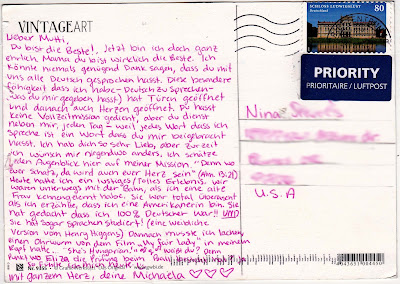OK, since my last post was about the fears of passing our mistakes on to our children, I thought I'd blog a little more about imperfect language...or in this case
impure language:
One of the phenomenons I'd like to discuss and one that happens frequently when raising children in a language that is not spoken in the community, is that you often get a little bit of language mixing. By this, I mean that when we are speaking the target (or minority) language, we often end up using "loan words" that we "borrow" from the community (or majority) language. This is a very common phenomenon and is not necessarily bad. For those interested in this, there is an excellent article found on Multilingual Living.com:
Loan Words and Borrowing: A Kind of Code-Swtiching?
I've been noticing a lot of this borrowing in our family. The sentence below is a prime example of borrowing. My little 6 year old Simon said this to me the other day (all covered in water). I immediately wrote it down--because it was so cute, and because it was such a good example of what happens so often in our home.
Mama, schau! Ich tue Wasser auf mich, weil ich will pretenden dass ich sweaty bin.
Translation: "Mom, look! I'm putting water on me because I want to pretenden that I'm sweaty."
In this instance, Simon couldn't think of the German word for pretend, so he just inserted the English word into the German syntax and "germanized" the word by adding an "en." It's quite an amazing feat for a 7-year old, if you think about it. The German word that actually belongs in that sentence is
spielen and has an "en" ending, which is why Simon added the "en" onto the word pretend.
After giving it some more thought, I realized, that very likely Simon
does know that the German word for pretend is
spielen. However,
spielen is a much more general word than pretend.
Spielen can also mean simply
to play. And it is possible to play with out pretending. So perhaps he used the word
pretend in an attempt to communicate more precisely. Maybe, he wanted me to understand that he wasn't just merely playing, but was pretending to be something he wasn't.
There are many reasons why we often use loan words from different languages. Sometimes, we simply don't know a specific word, so we replace it with it's translation in a more familiar language. Other times, it just takes too many words to words to communicate a thought that in a different language might only take a single word. However, like with Simon's example, sometimes one language simply has a better word for a given situation.
We use language to communicate. It is a tool. And because it is a tool, we almost always use the the most efficient and the most readily available words. Sometimes, we just can't think of the word in the target language and we're simply too lazy to figure out what that word is. It's much easier to just insert the word using a more familiar language. Call it laziness or call it brilliance. I tend towards the latter.
Yes, sometimes, I worry that my kids use a little too many English words in their German. And if I know the correct German word, I will often correct them and have them repeat the German word back to me to help them remember. Other times, I just let it go and I say to myself: Imperfect German is better than no German at all!

















